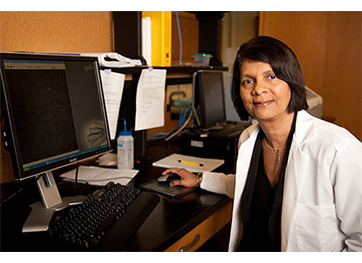Genome Sequencing Pioneer Sees Tailor-made Cancer Treatments in Near Future

Preethi Gunaratne will discuss the impact of advances in genome sequencing technologies
to unravel the genetic blueprints underlying complex diseases such as cancer at the
SXSW Health and MedTech Expo in Austin.∫˘¬´”∞“µ professor Preethi Gunaratne will be part of a panel addressing
personalized medicine at the South by Southwest (SXSW) Health and MedTech Expo in
Austin Tuesday, March 17.
The panel – “Personalized, Predictive Outcomes Empower Patients” – will discuss next-generation high-tech and high-touch approaches to empower clinicians and patients to explore the outcomes of similar patients for supporting more informed treatment decisions.
Gunaratne, an associate professor of biology and biochemistry in UH’s College of Natural Sciences and Mathematics, will discuss the impact of advances in genome sequencing technologies to unravel the genetic blueprints underlying complex diseases such as cancer. She will highlight findings from The Cancer Genome Atlas (TCGA) project and her contributions to the TCGA consortium on elucidating the role of small noncoding RNAs called microRNAs.
“We anticipate that, in the near future, all patients who present with cancer will have their tumors subjected to whole genome sequencing, and the genomic portrait of each patient’s tumor will be used as a framework for practicing precision medicine,” Gunaratne said. “The idea is that when a patient comes in to the clinic, a portion of the tumor biopsy will get sequenced. Then, based on the specific mutations that characterize each individual’s tumor, we and others working in this field will develop tools to predict clinical outcomes, such as life expectancy, as well as whether a patient will respond to conventional therapies, such as chemotherapy and radiation.”
To support this paradigm shift, Gunaratne says researchers are establishing a functional genomics pipeline that is linked to 3-D culture models of cancer. The goal is to systematically engineer each of the hundreds of mutations found in individual tumors and evaluate their impact individually. Ultimately, she says, the many researchers working to advance this field hope to be able to take a small number of cells from a patient’s biopsy and regenerate the tumor in a lab to test a library of all FDA-approved drugs on it, determining the combination of drugs that best suits each patient in real time.
Joining Gunaratne in this panel discussion are Jay Piccirillo, Director of the Clinical Outcomes Research Office at the Washington University School of Medicine; Claudia Williams, senior advisor for health technology and innovation for the Office of Science and Technology Policy at the White House; and Robert Palmer, CEO and Founder of PotentiaMED.
This year marks the first Health and MedTech Expo at SXSW, reflecting the growing importance of technology and innovation in improving health care. The event follows President Barack Obama’s announcement of the Precision Medicine Initiative, which is designed to leverage personal characteristics to develop more effective cancer treatments and validates the increasing need for personalized approaches in the health care industry.
The panelists are available for comment on the panel session, the Precision Medicine Initiative and the use of analytics in health care. For more information, visit .
WHO:
Noted experts on personalized medicine:
Preethi Gunaratne, ∫˘¬´”∞“µ
Robert Palmer, PotentiaMED
Jay Piccirillo, Washington University School of Medicine
Claudia Williams, Office of Science and Technology Policy at the White House
WHAT:
SXSW Health and MedTech Expo Panel
“Personalized, Predictive Outcomes Empower Patients”
WHEN:
5:15 to 6 p.m., Tuesday, March 17
WHERE:
JW Marriott Hotel
110 E 2nd St.
2nd Floor, Griffin Exhibition Hall
Austin, TX